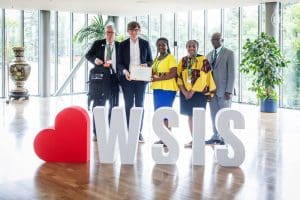 Growing up in Accra, the capital city of Ghana in West Africa, Dr. Jane Asantewaa Appiah-Okyere was fascinated by life outside of the city in small, rural communities. What was life like in these communities? How does it feel to visit a farm and spend nights gazing at the moon and stars in a pristine environment, away from the glow of city lights? Also, how did community residents overcome not having access to what she had in the city?
Growing up in Accra, the capital city of Ghana in West Africa, Dr. Jane Asantewaa Appiah-Okyere was fascinated by life outside of the city in small, rural communities. What was life like in these communities? How does it feel to visit a farm and spend nights gazing at the moon and stars in a pristine environment, away from the glow of city lights? Also, how did community residents overcome not having access to what she had in the city?
“I knew that I was not better than people living in rural communities, as there are advantages and disadvantages to both urban and rural life. They have their limits and I have my limits,” she noted.
Decades later, Appiah-Okyere is now a Syracuse University Doctor of Professional Studies graduate and is still thinking about residents in rural and underserved communities in Africa and how she can contribute to improving the living conditions in these communities.
“No child planned to be born in a rural or underserved community. Therefore, we should not ignore these children and their families,” she said. “If we neglect their needs, these children may be left behind academically and socially, and they might become involved with negative influences.”
In 2022, she was awarded the Collaboration for Unprecedented Success and Excellence (CUSE) Grant, which facilitated her implementation of a teacher professional development workshop in the Essuekyir community in Ghana.
In May 2024, she received an international award at the World Summit on the Information Society, sponsored by the United Nations, in Geneva, Switzerland for her research that focuses on bringing Internet access to rural communities in Ghana. The Summit’s ceremony celebrated Appiah-Okyere’s work in creating the Africa Community Internet Program, which has brought Internet connectivity and teacher professional training to Essuekyir, a rural community in Ghana using a tool called an Internet Backpack.
The Internet Backpack was invented years ago at Syracuse University’s School of Information Studies, and Appiah-Okyere’s research has brought it greater visibility.
“Jane’s carefully controlled research and data analysis, with Professor John Jordan’s strong support, has moved the dial in validating how many hundreds of millions in Africa and beyond can be reached and meaningfully connected to the Internet for educational purposes, health and other vital information previously beyond their reach,” said iSchool Associate Professor Lee McKnight, who helped to guide the research and also attended the awards ceremony.
When Appiah-Okyere first began her Doctor of Professional Studies program, she thought about focusing her research on the financial technology (FinTech) industry concentrating on the mobile money environment in the African region. She changed course after discussing her research proposal with Professor Danielle Taana Smith, the director of the honors program at Syracuse University, who then discussed the significance of the Internet Backpack project for connecting the unconnected.
“That was when I actually got the idea that, ‘Oh, this Internet Backpack can help in rural communities in developing countries that do not have Internet access,’” Appiah-Okyere said.
Before beginning her research, she took the Internet Backpack to Ghana to determine how it would perform. She worked with Dr. Ephrem Kwaa-Aidoo, a professor at University of Education, Winneba, who recognized the potential of the Internet Backpack technology and encouraged her to further develop her research plans.
“Initially, my research focus was on training children in a rural community. However, Professor Kwaa-Aidoo offered a different perspective, saying, ‘When you train a child, that child may eventually leave the community. But when you train a teacher, you train an entire community,’” Appiah-Okyere recalled. He recommended that the research be conducted in a centralized location, such as a library, where the entire community could access its benefits and utilize the Internet access provided.
While she is proud of the work she has done to empower teachers in the Essuekyir community in Ghana, Appiah-Okyere knows that there’s much more to be done. An estimated 2.6 billion people, or 33% of the world’s population, do not have access to the Internet, according to the International Telecommunications Union.
“The digital divide remains a pressing issue, and my study underscores the urgent need for further investments in infrastructure and training to ensure equitable access to technology in education across underserved communities, thereby contributing to fulfilling the United Nations Sustainable Development Goal (SDG) 4, which advocates for quality education for all,” she said.
Since graduating with her doctorate in May, Appiah-Okyere’s main focus has been to continue her research and hopefully to expand it to other underserved communities globally. More than anything, she aspires to motivate future generations to continue this important work.
She also works as a functional business analyst at the division of Student Experience here at Syracuse University.
“I have worked in the information management field for quite a long time, so my goal is to empower the younger generation, both girls and boys to excel in the same environment,” she said. “Because if we train both genders to learn and work together, they will grow up to respect each other in their future work, family and social environments.”
